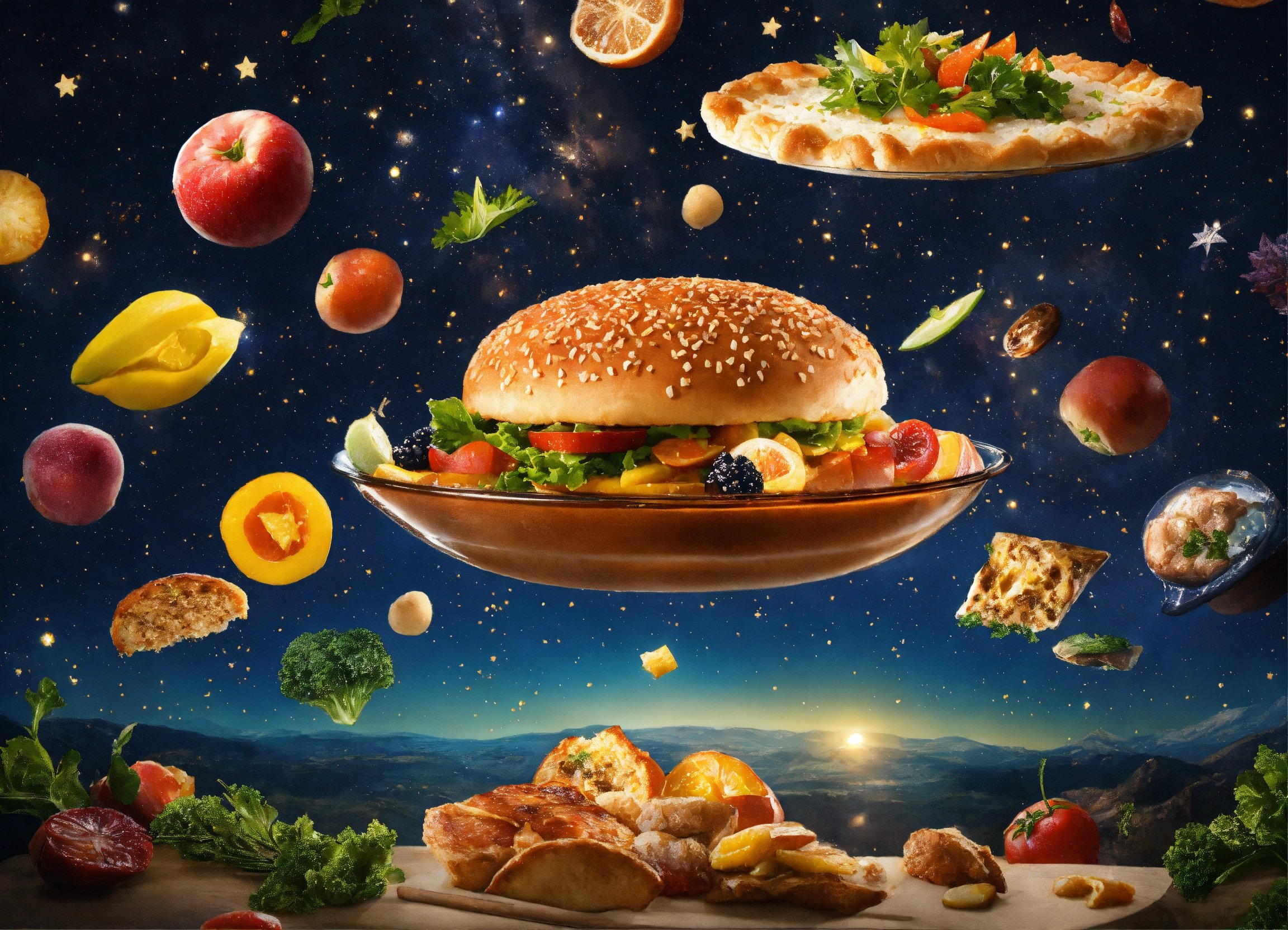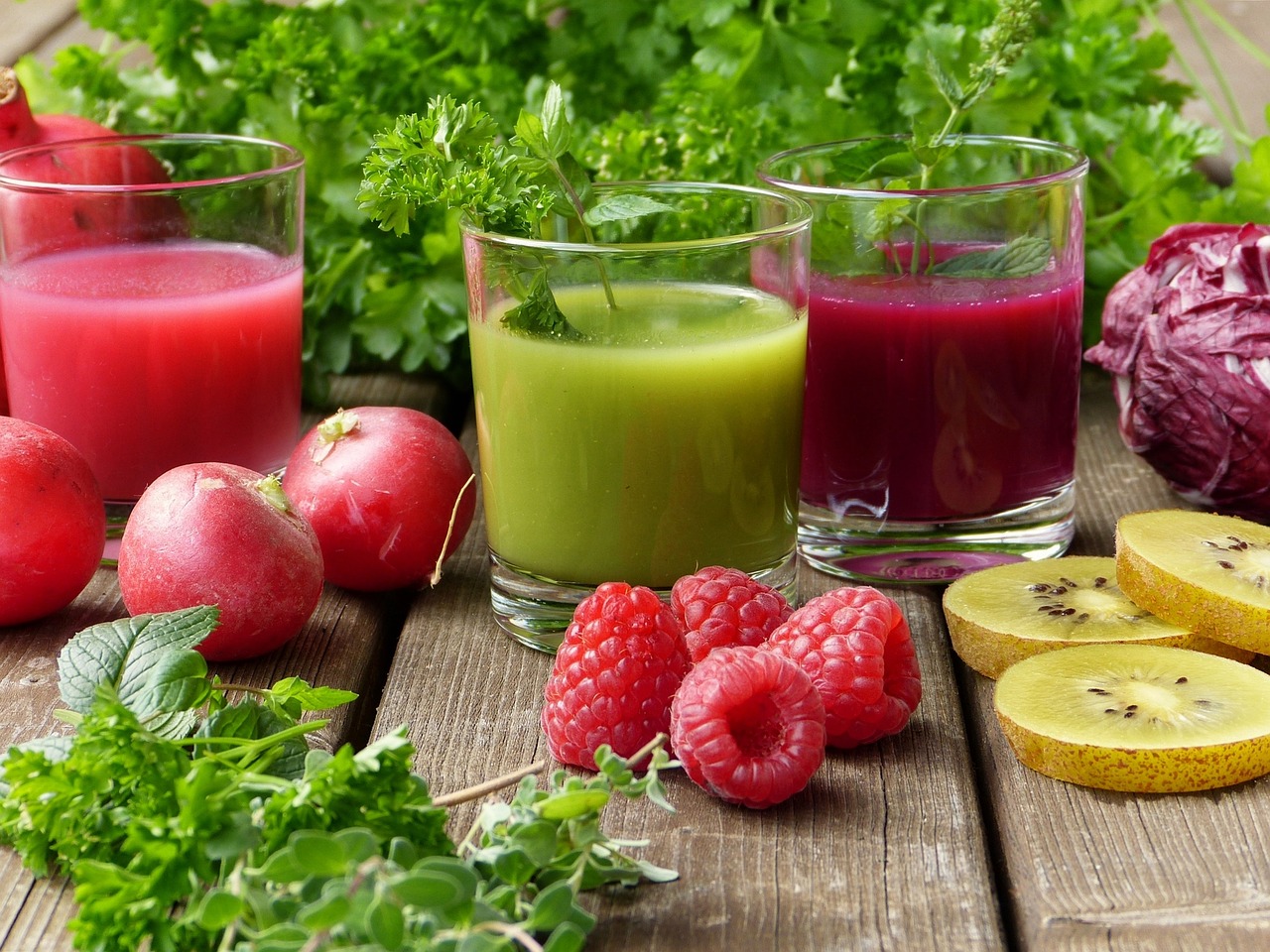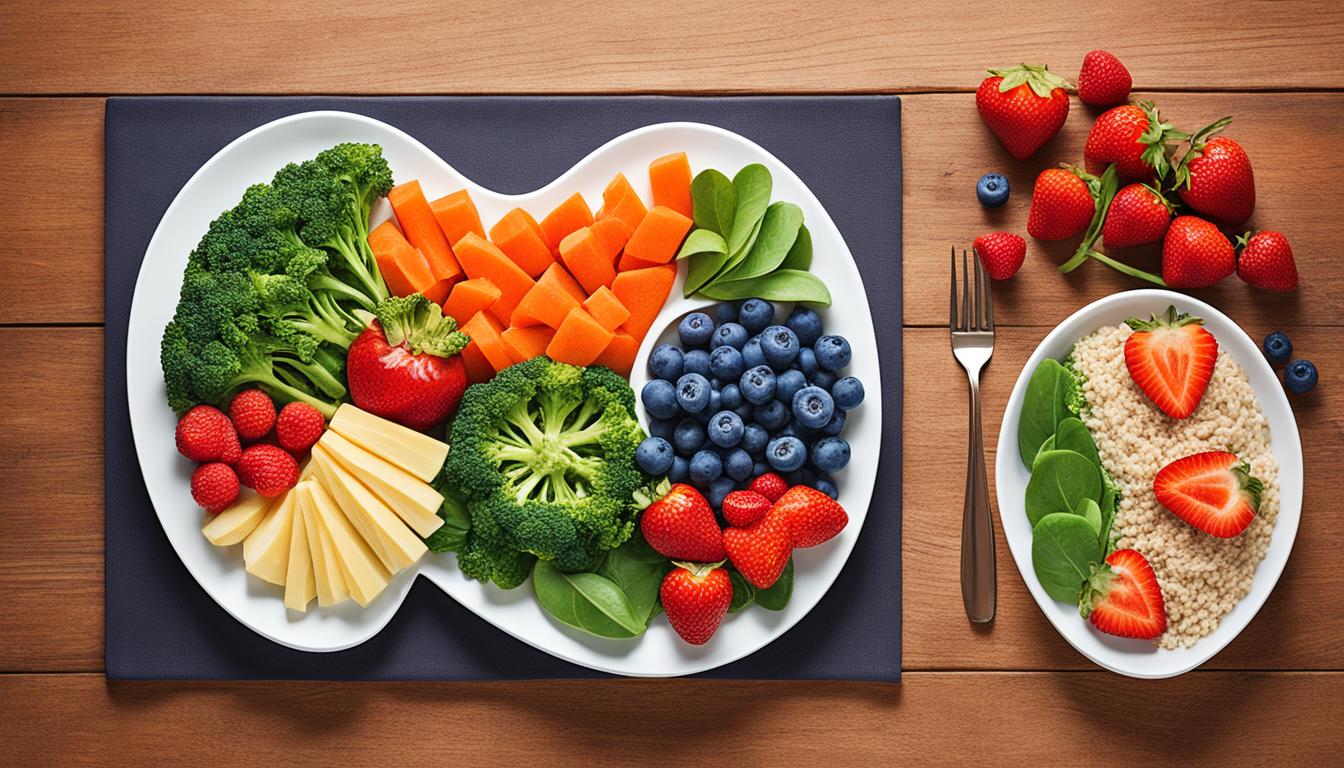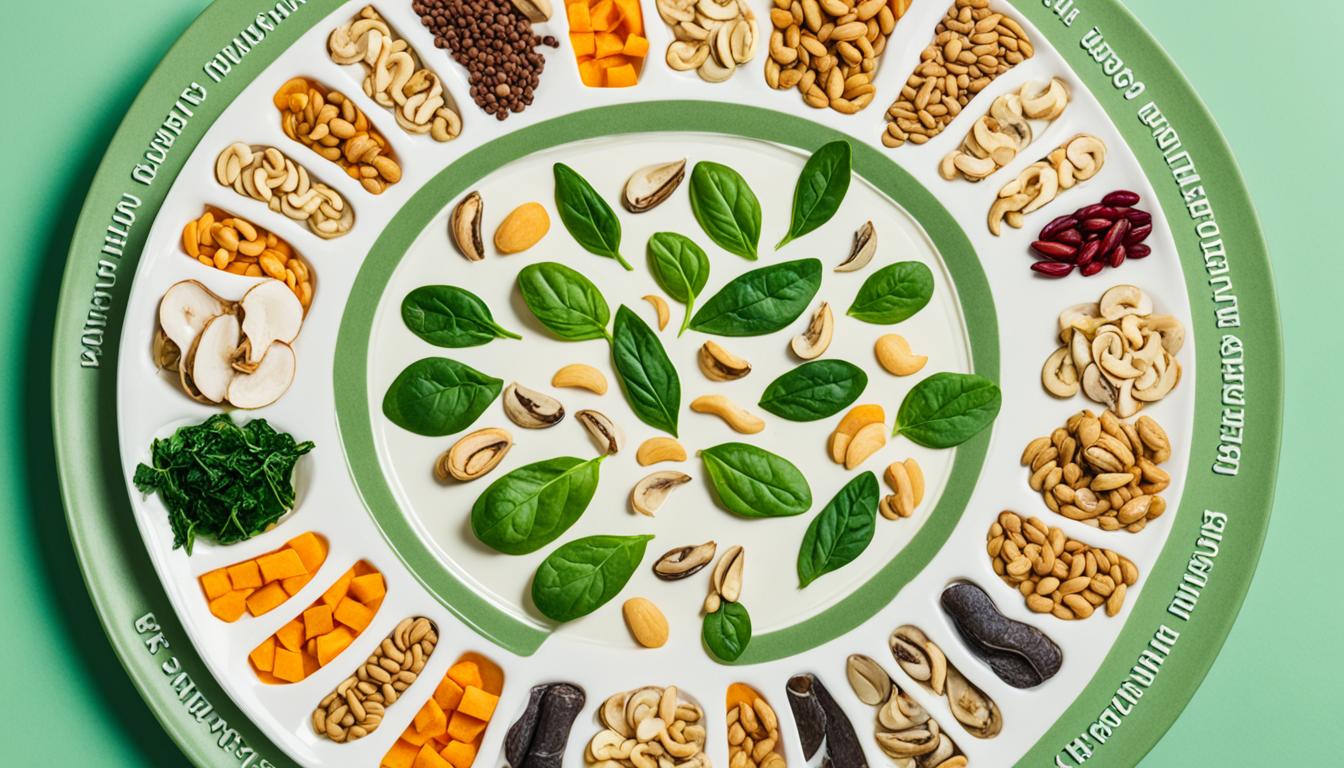Allergic Foods to Avoid While Breastfeeding

Are you a breastfeeding mom? Do you know which foods you should avoid to ensure your baby’s well-being? While there isn’t a definitive list for all breastfeeding mothers, certain foods may cause sensitivity or discomfort in some babies. Let’s explore the topic of allergic foods to avoid while breastfeeding and discover safe foods for breastfeeding moms.
Key Takeaways:
- Being mindful of the foods you consume while breastfeeding is important for your baby’s health.
- There isn’t a one-size-fits-all list of foods to avoid, but certain allergenic foods should be approached with caution.
- Pay attention to your baby’s reactions and consult with a healthcare provider if you have concerns about food allergies or sensitivities.
- Limited alcohol and caffeine intake, choosing low-mercury fish, and watching for dairy allergies are important considerations for breastfeeding moms.
- While breastfeeding may help reduce the risk of developing allergies in babies, it’s not a guarantee of complete immunity
Foods to Limit or Avoid While Breastfeeding
While breastfeeding is a wonderful experience, it’s important to be mindful of the foods you consume to ensure the well-being of both you and your baby. Although there isn’t a definitive list of foods that all breastfeeding mothers should avoid, there are common food allergens that may cause sensitivity or discomfort in some babies. Being aware of these allergenic foods can help you make informed choices about your diet while breastfeeding.
Common Food Allergens for Breastfeeding
When breastfeeding, it’s essential to understand the common food allergens that could potentially affect your baby. Some of the most common food allergens for breastfeeding include:
- Cow’s milk
- Eggs
- Soy
- Wheat
- Peanuts
- Tree nuts
- Fish
- Shellfish
In addition to these allergens, some babies may also be sensitive to specific spicy foods, caffeine, or alcohol. It’s important to pay attention to your baby’s reactions and symptoms after consuming these foods to determine if they have any adverse effects.
Recognizing Breastfeeding and Food Sensitivities
It’s common for babies to have food sensitivities while breastfeeding, especially during the first few months. If your baby experiences fussiness, gassiness, colic, eczema, or changes in their bowel movements after you consume certain foods, it may indicate a potential food sensitivity. In such cases, it’s recommended to avoid those foods and observe if the symptoms improve.
It’s important to consult with a healthcare provider if you suspect your baby has food sensitivities or allergies. They can provide guidance and support to help you create a balanced diet while meeting your nutritional needs and ensuring your baby’s well-being.
Foods to Steer Clear of While Breastfeeding
While not all babies will have sensitivities or allergies to these foods, it’s wise to exercise caution and monitor your baby’s reactions. Here’s a list of foods to be mindful of while breastfeeding:
| Foods to Avoid | Reasons to Avoid |
|---|---|
| Cow’s milk | Contains proteins that can cause allergic reactions in some babies |
| Eggs | May trigger allergies or sensitivities |
| Soy | Some babies may be allergic or sensitive to soy |
| Wheat | Can cause discomfort in babies with gluten sensitivity |
| Peanuts | Common allergens that may cause severe reactions in some babies |
| Tree nuts | May trigger allergies or sensitivities |
| Fish | Some fish contain high levels of mercury, which can be harmful to babies’ developing nervous system |
| Shellfish | May cause allergic reactions in some babies |
| Spicy foods | Can irritate the baby’s digestive system and lead to discomfort |
| Caffeine | Excessive consumption may affect the baby’s sleep patterns |
| Alcohol | Alcohol passes into breast milk and can negatively impact the baby’s development and sleep patterns |
Remember, every baby is unique, and their reactions to certain foods may differ. It’s essential to closely monitor your baby’s responses and consult with a healthcare provider if you have any concerns or questions about your diet while breastfeeding.
Alcohol and Caffeine While Breastfeeding
While breastfeeding, it’s important to consider the impact of alcohol and caffeine consumption on your baby’s health. Although it is generally safe to consume these substances in moderation, it’s recommended to limit your intake to minimize any potential risks.
Alcohol and Breastfeeding:
Alcohol can pass from your bloodstream into breast milk, potentially affecting your baby’s development. It can also disrupt your baby’s sleep patterns and overall well-being. To minimize these risks, it’s advisable to wait a few hours after consuming alcohol before breastfeeding. This gives your body time to metabolize the alcohol, reducing the amount that passes into your breast milk.
Caffeine and Breastfeeding:
Caffeine, like alcohol, can also pass into breast milk. Some babies may be sensitive to caffeine and experience restlessness, irritability, or sleep disturbances. To avoid potential discomfort for your baby, it’s best to limit your caffeine intake while breastfeeding. Monitor your baby’s reactions and consider reducing or eliminating your caffeine consumption if you notice any adverse effects.
Remember, moderation is key.
Though it’s safe to consume alcohol and caffeine in moderation while breastfeeding, it’s important to remember that excessive amounts can have negative effects on your baby. Err on the side of caution and be mindful of your alcohol and caffeine intake.
While it’s essential to be cautious of alcohol and caffeine, it’s equally important to maintain a balanced and nutritious diet while breastfeeding. Prioritize whole foods, such as fruits, vegetables, lean proteins, and whole grains, to ensure that you and your baby receive essential nutrients. Staying hydrated by drinking plenty of water throughout the day is also crucial for optimal milk production and overall well-being.
Tip: If you’re craving a warm beverage, opt for decaffeinated or herbal teas, which can provide a calming and comforting experience without the caffeine content.
Alcohol and Caffeine While Breastfeeding: Practical Tips:
- Avoid consuming alcohol or caffeine right before breastfeeding to minimize their presence in your breast milk.
- Monitor your baby’s reactions and adjust your intake accordingly if you notice any adverse effects.
- Stay hydrated by drinking plenty of water throughout the day.
- Consider alternative warm beverages such as decaffeinated or herbal teas, which can offer relaxation without the caffeine content.
By being mindful of your alcohol and caffeine consumption, you can ensure a healthy and safe breastfeeding experience for both you and your baby.
Fish and Mercury Levels:
Fish is a valuable addition to a lactation diet for breastfeeding moms, as it provides an excellent source of protein and essential omega-3 fatty acids. These nutrients are not only beneficial for your own health but also important for your baby’s development. However, it’s crucial to be cautious about the levels of mercury present in certain types of fish, as high mercury levels can pose risks to your baby’s developing nervous system.
When selecting fish to include in your diet, opt for varieties that are low in mercury, such as shrimp, salmon, and light canned tuna. These options offer the advantages of omega-3 fatty acids without the potential dangers of excessive mercury exposure. On the other hand, it’s important to avoid fish with high mercury levels, such as swordfish, king mackerel, and shark, as they can pose risks to your baby’s health.
By consuming fish in moderation and making informed choices about low-mercury options, you can reap the nutritional benefits without compromising your baby’s well-being. Remember to vary your diet and introduce a variety of other protein sources to ensure a well-rounded and nourishing lactation diet.
Dairy and Food Allergies
One of the most common food sensitivities among breastfed babies is dairy. Dairy products contain proteins that can pass into breast milk and may cause allergic reactions in some babies. If you notice that your baby is fussy, gassy, or develops unusual stools or rashes after consuming dairy products, it may be worth cutting out dairy from your diet for a few weeks to see if there is an improvement in your baby’s symptoms.
It’s important to read labels carefully, as dairy can be found in many processed foods. If you suspect a dairy allergy, it’s best to consult with a healthcare provider for proper diagnosis and guidance.
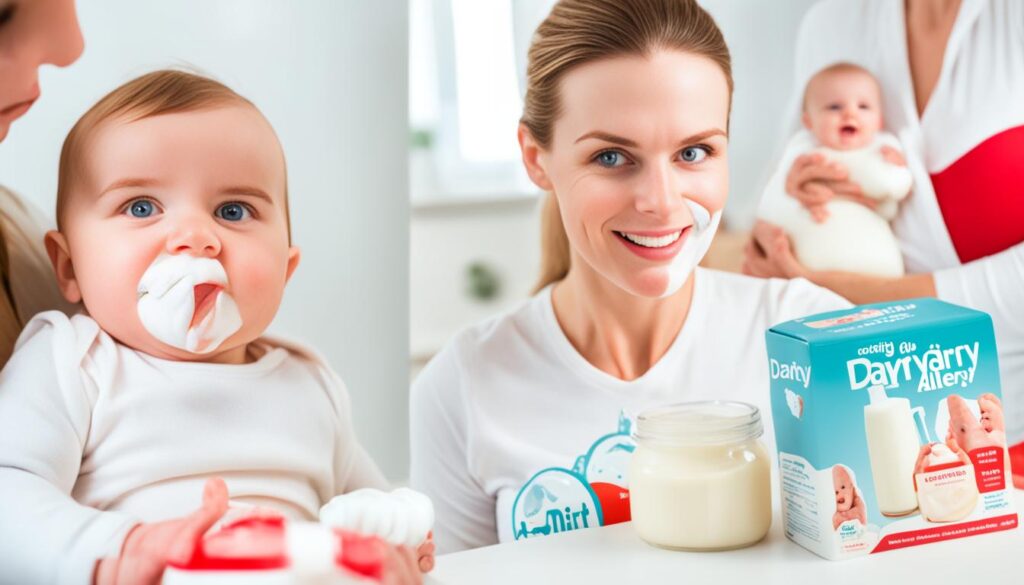
| Dairy Products | Alternatives |
|---|---|
| Milk | Plant-based milk alternatives (e.g., almond milk, soy milk, coconut milk) |
| Cheese | Non-dairy cheese alternatives (e.g., cashew cheese, almond cheese, vegan cheese) |
| Yogurt | Non-dairy yogurt alternatives (e.g., coconut milk yogurt, almond milk yogurt) |
| Ice Cream | Non-dairy ice cream alternatives (e.g., coconut milk ice cream, almond milk ice cream) |
Maintaining a Healthy Diet While Breastfeeding
While breastfeeding, it’s essential to not only consider the foods to avoid but also prioritize a healthy and balanced diet. Ensuring that you consume nutrient-rich foods will not only benefit your own health but also provide your baby with essential nutrients through breast milk.
One helpful guideline to follow is the MyPlate method recommended by the U.S. Department of Agriculture. This approach emphasizes the importance of incorporating a variety of food groups into your daily meals. Here’s a breakdown of the recommended proportions:
| Food Group | Proportion |
|---|---|
| Fruits and vegetables | Fill half your plate |
| Whole grains | Fill a quarter of your plate |
| Protein | Fill a quarter of your plate |
| Dairy | Include a side serving, such as milk or yogurt |
Remember to choose a variety of fruits, vegetables, whole grains, and lean protein sources to maximize the nutritional value of your meals. Additionally, it’s important to stay hydrated by drinking plenty of water throughout the day.
By following these guidelines, you can support your own well-being while providing your baby with the essential nutrients they need for healthy development.
It’s important to note that every breastfeeding journey is unique, and if you have specific dietary concerns or restrictions, it’s best to consult with a healthcare provider or a registered dietitian who specializes in breastfeeding. They can offer personalized guidance to ensure you are maintaining a healthy diet that aligns with your needs and preferences, while also considering any allergies or sensitivities that may be relevant.
Watching for Allergic Reactions in Your Baby
While breastfeeding, it’s uncommon for babies to develop food allergies, but it is still possible. It’s important to be aware of the signs of allergic reactions in your baby so that you can take appropriate action. Some common signs of food allergies include eczema, hives, wheezing, vomiting, or diarrhea.
If you suspect that your baby may have a food allergy, you can try an elimination diet. This involves removing the suspected food from your diet for a period of time and observing if there is an improvement in your baby’s symptoms. Keeping a food diary can also help you track any correlations between your diet and your baby’s reactions.
“By eliminating the suspected food and monitoring your baby’s reaction, you can gain valuable insights into their food sensitivities and allergies.”
However, it’s important to note that food allergies can be complex and may require professional guidance. If the symptoms persist or worsen, it’s crucial to consult with a healthcare provider for proper diagnosis and guidance. They can help you determine if the symptoms are indeed caused by a food allergy and provide appropriate recommendations for managing your baby’s allergies.
Remember, every baby is unique, and what works for one may not work for another. It’s essential to stay vigilant and responsive to your baby’s needs and to seek professional advice when necessary.

Signs of allergic reactions in babies:
- Eczema
- Hives
- Wheezing
- Vomiting
- Diarrhea
Breast Milk and Allergic Risk
Research suggests that breastfeeding may help reduce the risk of developing allergies in babies. Breast milk contains immune factors and antibodies that can help protect against allergic reactions. It also provides beneficial bacteria and helps establish a healthy gut microbiome, which may play a role in immune system development.
“Breast milk is a dynamic fluid that adapts to meet the changing needs of your baby. It contains antibodies, enzymes, and other substances that support your baby’s immune system and help prevent allergic reactions.” – Dr. Jane Smith, Pediatric Allergist
While breastfeeding can offer some protection against allergies, it’s important to remember that it may not guarantee complete immunity. Some babies may still develop allergies, even if they’re exclusively breastfed. Allergic reactions can occur due to various factors, such as genetic predisposition or exposure to allergens from other sources.
If you have concerns about allergies or sensitivities in your baby, it’s best to consult with a healthcare provider for guidance. They can help you identify potential allergens, recommend appropriate testing if needed, and provide personalized advice on how to minimize your baby’s risk of developing allergies.
Allergenic Risk Reduction Strategies
While breastfeeding is beneficial, there are a few strategies you can adopt to further reduce the allergenic risk for your baby:
- Introduce allergenic foods gradually: According to current research, early introduction of allergenic foods like peanuts, eggs, and dairy products (if there is no family history of dairy allergy) between 4 and 6 months of age may actually help reduce the risk of developing allergies.
- Continue breastfeeding while introducing solid foods. Breastfeeding alongside the introduction of solid foods can provide ongoing immune protection against allergies and help support your baby’s developing immune system.
- Avoid smoking and exposure to secondhand smoke: Smoking during pregnancy and exposing your baby to secondhand smoke can increase the risk of allergies. It’s important to create a smoke-free environment for the well-being of both you and your baby.
- Consider probiotics: Probiotics, often found in certain yogurts or available as supplements, may help promote a healthy gut microbiome in your baby, potentially reducing the risk of allergies.
Remember, each baby is unique, and what works for one might not work for another. It’s essential to consult with a healthcare provider before making any significant changes to your baby’s diet or health regimen.
| Allergenic Risk Reduction Strategies | Benefits |
|---|---|
| Introduce allergenic foods gradually | May reduce the risk of allergies |
| Continue breastfeeding while introducing solids | Provides ongoing immune protection |
| Avoid smoking and exposure to secondhand smoke | Reduces the risk of allergies |
| Consider probiotics | Promotes a healthy gut microbiome |
Therefore, breastfeeding is a unique and wonderful experience that provides numerous benefits for both mother and baby. It is a beautiful way to bond with your little one and provide them with essential nutrition. While breastfeeding, it is important to be mindful of potential allergenic foods and monitor your baby’s reactions.
Although there isn’t a one-size-fits-all list of foods to avoid while breastfeeding, being aware of common allergenic foods such as cow’s milk, eggs, soy, wheat, peanuts, tree nuts, fish, and shellfish can help minimize the risk of food sensitivities or allergies. It is crucial to pay attention to your baby’s symptoms, such as fussiness, rashes, or digestive issues, and consult with a healthcare provider if you have concerns.
Remember to maintain a well-balanced diet that includes plenty of fruits, vegetables, whole grains, and protein sources. Additionally, staying hydrated is crucial for both you and your baby’s health. Trust your body’s cues and listen to what it needs during this special time.
Your breast milk is a precious source of nutrition for your baby and helps build their immune system. By being aware of potential allergies, having a well-balanced diet, and consulting with a healthcare provider if needed, you can ensure a smooth and enjoyable breastfeeding experience for both you and your baby.
FAQ
What are some common food allergens to avoid while breastfeeding?
Should I limit my alcohol and caffeine intake while breastfeeding?
Are there certain types of fish I should avoid while breastfeeding?
Should I avoid consuming dairy while breastfeeding?
What should I include in a healthy diet while breastfeeding?
How can I watch for allergic reactions in my baby?
Does breastfeeding reduce the risk of allergies in babies?
Why is it important to be mindful of potential allergens while breastfeeding?




